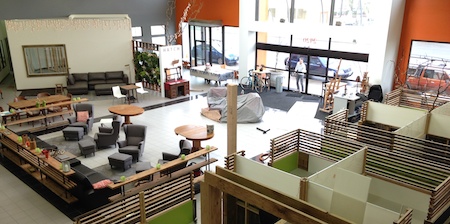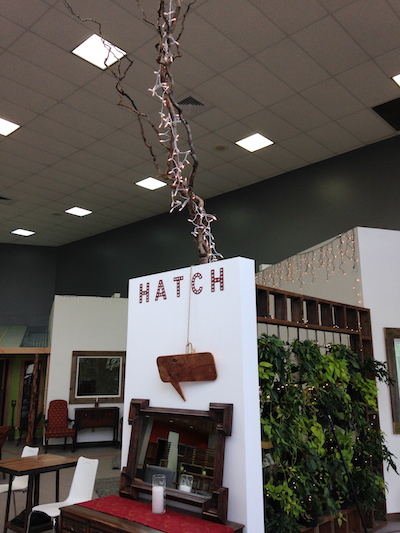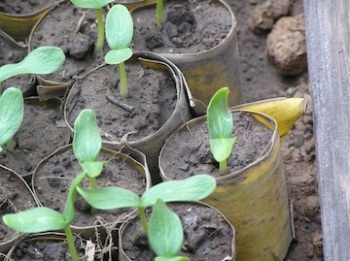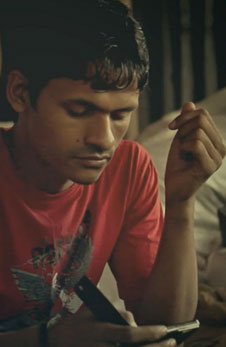Posts tagged ‘social enterprise’
Sneak Preview of Hatch, Portland’s New Co-work Space for Social Entrepreneurs
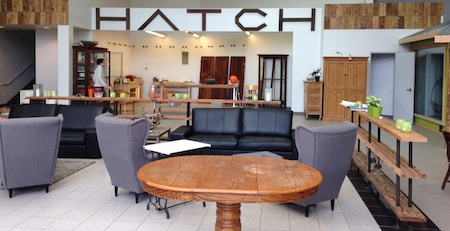 We recently spoke with Jon-Paul Bowles about Hatch, a new community innovation lab and co-working space for Portland social entrepreneurs. Jon-Paul is working with Hatch and Springboard Innovation Founder Amy Pearl to bring the new space to life and create a system of supporting services for local social entrepreneurs.
We recently spoke with Jon-Paul Bowles about Hatch, a new community innovation lab and co-working space for Portland social entrepreneurs. Jon-Paul is working with Hatch and Springboard Innovation Founder Amy Pearl to bring the new space to life and create a system of supporting services for local social entrepreneurs.
Impact Entrepreneurs: How would you describe Hatch in a single Tweet?
Jon-Paul: Hatch: A Community Innovation Lab. An innovation generator, a place where social and local entrepreneurs create solutions. Where good works.
What role will Hatch play in the local community?
Hatch is both a place and a community. We’ve been surprised by the power of place because we’ve already seen people help each other out organically. So in one sense, it’s a place where a lot of incredibly bright, motivated social entrepreneurs work, have parties, host events, and take meetings. A beautiful co-work space. But in the deeper sense Hatch is simply a community of like-minded people who have a lot to learn from and offer each other and are passionate about using enterprise to solve big problems one small solution at a time. We have specific programs to draw community in. So a lot of different kinds of people find a home in this community. More and more every day.
What inspired founder Amy Pearl to create Hatch?
Amy has deep passion and expertise about helping create healthy local economies. Through Springboard Innovation, she’s been working on helping local economies access local capital for almost a decade. She was reluctant to look for a building to house the programs because changing how we invest in local economies really is about influencing existing institutions, habits and economies, and creating new ways to use legal and financial processes to free up capital for community investing. But it became clear that there’s a demand for people working in social enterprise to have spaces that hatch their ideas and build enterprises. Once she found the old Timberline Dodge building, the rest fell into place. The response has been really positive. And we’re not even open yet.
What type of organization is the best fit for Hatch?
Social enterprise. As your program is really good about explaining, social enterprise can take different forms, be for- or non-profit, etc. Anyone who wants to use enterprise as a means to accomplish a social or environmental end is a good fit. It doesn’t matter if you’ve already been wildly successful, or are just putting the pieces together and want some help.
What services does Hatch offer, and how much do they cost?
Hatch has a few different services. We have an incubator space that will provide access to top-notch experts brought in to help make them successful. Right now, desks in the startup space are $250.
We also have co-work space, which starts at $95 a month for 5-day access, and tops out at $295 for full-time, 24-hour access.
We also have Fireboxes (like cubes, but cooler) that cost $350 a month. It’s a dedicated desk with a locker, and lots of other amenities.
But most importantly, all our members have access to our programs, workshops and seminars — which revolve around getting them the expertise they need to be successful in whatever work they’re doing. So we’re trying to create an ecosystem that people can step into and thrive.
Do you have any interesting stories from the planning and buildout process?
The whole process has been a lot of fun. When you step into an old car dealership with a very 1990s feel and say, “Yeah, this would make a great co-work space for the community,” you have to be able to roll with the punches (just like any social enterprise startup). One minute you’re engaging leaders in the Portland community and the next you’re ripping off old awnings and wondering how to install more outlets. But mostly it’s been fun to see our team come together with our ideas and have the whole process evolve. Someone walked in the other day and said, “Wow. This is the new sexiest workspace in Portland.” That was fun.
When is the official launch party?
Glad you asked. We’d love to welcome the PSU community.
Where: 2420 NE Sandy Blvd, Portland
When: Thursday, January 30th | 5:00 – 8:00 PM
Who: Meet tenants including XRAY, Albina Opportunities Corporation, TEDx, Mojalink, and many others who are helping form the Hatch Community. Learn how you can grow your own project or get involved in moving another forward. Hear about our 2014 calendar of many new and favorite programs and events.
Cost: Free! Bring a friend and introduce us!
RSVP: to rsvp@hatchthefuture.org
Is there anything else you’d like our readers to know?
Please check out the Hatch website to learn more. Or just come by and ask for a tour.
I also want to say that Portland is a great place for social enterprise. It’s nascent, but emerging. There are a lot of dedicated people already doing a lot in that space. Our goal is to grow the entire ecosystem of social enterprise, to collaborate with many partners like Impact Entrepreneurs and complement each other’s work.
January 16, 2014 at 9:03 am Impact Entrepreneurs at Portland State University Leave a comment
Insert Potty Humor Joke Here: Reflections from a Social Enterprise Field Study in Cambodia
Each year a mix of community members and PSU students travel to India or Cambodia with Impact Entrepreneurs to spend a few weeks working, learning and collaborating with social enterprises. This year the group is in Cambodia. Here are their stories.
—
By Devin Liebmann, 12/14/13
During our initial meeting with East Meets West to get oriented on our project, we poured over reams of data to try to get a feel for their operations. East Meets West offers rebates for people to install latrines. Initially these numbers seemed so far away and were not connected to anything. As we asked questions and dug into some of the data, our host, Kim Hor the Country Director for East Meets West in Cambodia, pulled up some pictures of the installations to illustrate a point. Suddenly everything made sense.

Seeing pictures of people standing in front of their newly constructed latrines breathed life into the cold hard statistics that we all like to throw around. Suddenly, the $100 USD written down on a piece of paper next to a blue thumbprint, leapt forth from the page as Kelly green tin roof and siding, solid concrete floors, 2 by 4’s, and a ceramic urn. Each of these details had been rolled up into that single, inflexible, unexpressive number with a dollar sign in front of it hiding each of these components. Smaller dollar figures revealed Tyvek stretched across bamboo and sticks to keep out wind and rain, a 5 gallon plastic bucket to hold water, and dirt floors. However, the same essential components as the more expensive latrines remained the same throughout. As each picture was opened, a slideshow of people’s stories unfolded before us.

The expressions on their faces were priceless, some squinting in the sun, others with knowing eyes patiently awaiting the end of the photo op, and even a few smiling, while clutching their rebate paperwork.

Each one of those individual numbers represents a story. A story of struggle, sickness, and ultimately triumph. Of the 313 households surveyed in Kampot Province, 65% did not have latrines prior to East Meets West beginning work there. Of those without latrines, 90% said it is because they cannot afford to buy a latrine. It is really important to maintain the connection between the numbers and the people that those numbers represent. In a world of information overload, large numbers begin to lose their meaning. We as human beings cannot easily grasp what each of these numbers truly represent without stories to go with each one or a photograph that can bring a particular data point to life. Tomorrow we will begin meeting these people to hear their wants, needs, and desires first hand.
New Growth, Old Ways: Reflections from a Social Enterprise Field Study in Cambodia
Each year a mix of community members and PSU students travel to India or Cambodia with Impact Entrepreneurs to spend a few weeks working, learning and collaborating with social enterprises. This year the group is in Cambodia. Here are their stories.
—
By Tanya Murray
Today in the field we interviewed a farmer about his growing practices. He proudly explained that he’d harvest a kilogram of cucumbers off of two small plots of land. I asked him what he attributed this high yield to. I expected to hear that yields were improved by using black plastic to cover the bed tops, drip irrigation to supply a steady of water to his crop or the use of a newly available fertilizer or seed. Instead he attributed these yields to using compost that he made from a mix of material from a termite mound, buffalo dung, and hay. When I asked how he learned to make this compost his response ways simple. “From my ancestors,” he said. Another group described learning from a farm business advisor that farmers from his village were employing crop rotation practices, a technique also passed down from past generations to maintain soil health.
Having spent over twelve years as an organic vegetable farmer in the states, when I hear stories about farming practices passed down from ancestors, based on the integrity and resilience of natural systems, I recognize tremendous value. To me these methods are familiar and not far from the compost piles and crop rotations I’ve used myself to benefit to soil health, plant nutrition, and ultimately human health. It’s easy to be seduced by what is familiar and fits into my way of doing things. I suspect this is true for most of us.
At the same time I recognize the need to for continuous improvement, adaption and learning that is at the heart of innovation and entrepreneurship. Clearly there is a need for the kind of “New Growth” that the iDE program, Lors Thmey, that we are here observingis named for. My concern is that it is can be easy to embrace new technology without fully understanding the value of the old ways already in place. This seems especially true when working in a country and culture that is not our own. In his paper, “The Meaning of Social Entrepreneurship”, J. Gregory Dees shares Joseph Schumpeter’s description of “entrepreneur as the innovators who drive the “creative-destructive” process of capitalism.” This description illuminates what I see as a potential risk of entrepreneurship that charges ahead to new technology and innovation without first fully understanding what is already in place. The risk here, being that in our effort to innovate and create, it can be all too easy to destroy opportunity and value that already exists. Dees also offers a valuable perspective here. He says, “Entrepreneurs need not be inventors. They simply need to be creative in applying what others have invented.” To me this serves as an important reminder to look for opportunity that create new growth while incorporating, building on, and honoring old ways.
An Introduction to Social Intrapreneurship
We typically assume an entrepreneur is someone who founded a new organization, but some of the leading researchers on the topic argue that “starting a business is not the essence of entrepreneurship.” Instead, it is a focus on identifying and leveraging opportunities, creating positive change in the economy, and moving beyond the constraints imposed by a specific role or a lack of resources. [1] This means that entrepreneurs can be found in corporations, nonprofits, universities, and the government. To avoid confusion with those starting a new venture, entrepreneurs working inside an existing organization are known as “intrapreneurs” a term coined by Gifford and Elizabeth Pinchot. If intrapreneurial efforts are focused on creating social or environmental value, rather than just private value, they are social intrapreneurs.
Grameen Intel, a social business formed in partnership between Intel Corporation and the Grameen Foundation, is an outstanding example of social intrapreneurship in a corporate setting. Founder and CEO Kazi Huque worked within Intel to develop a new organization that combines Intel’s technology expertise with Grameen’s social impact to create healthcare and agriculture software serving the rural poor in Bangladesh. Huque had to act as a true entrepreneur to develop the model, establish the partnership and secure internal funding for the new venture.
Central City Concern (CCC), a nonprofit in Portland, Oregon that works to end homelessness through housing, healthcare, and employment, has created an entire portfolio of internal social enterprises. From janitorial and street cleaning services to a bedbug-resistant bed frame and their own coffee brand, these businesses each serve a unique role in training and employing CCC clients, raising awareness for their mission, or generating income for the organization. CCC has even created, in essence, a specific role to manage social intrapreneurship: Director of Social Enterprises, a position currently held by experienced social entrepreneur Clay Cooper.
Portland State University recently launched an intrapreneurship challenge, reTHINK PSU, calling for innovative internal proposals to reimagine university education. One of the award winners was The Business of Social Innovation, an online program in social entrepreneurship developed by our Impact Entrepreneurs team. The program takes the innovative approach of welcoming professionals, undergraduate students, and graduate students into the same courses, which can be taken for academic credit or in pursuit of a professional certificate. The program therefore both teaches social intrapreneurship and is itself an example of social intrapreneurship in an academic setting.
As social intrapreneurship becomes increasingly recognized across sectors, a number of practitioner resources have been developed. The League of Intrapreneurs provides resources, connections, and stories of corporate social intrapreneurship. The Echoing Green foundation has developed a “Field Guide for Corporate Changemakers.” Net Impact, a global organization of sustainable business professionals, provides an intrapreneurship toolkit and sponsors yearly Impact at Work Awards.
Social entrepreneurship is not solely the domain of those launching a new company. No matter what type of organization you work in — corporation, nonprofit, government agency or academic institution — you can embody the principles of entrepreneurship to start something new and make a positive impact on the world as a social intrapreneur.
[1] Professor J. Gregory Dees, “The Meaning of Social Entrepreneurship.”
—
By Jacen Greene, Program Manager, Social Enterprise Initiatives at Portland State University’s Impact Entrepreneurs
December 4, 2013 at 2:43 pm Impact Entrepreneurs at Portland State University Leave a comment
Apply to the 2013 Social Innovation Incubator Circuit Program
Here’s a quick quiz. Are you:
- Obsessed with a business idea that will make the world a better place?
- Open to taking a hard look at your ideas and making them better?
- Addicted to improving lives?
- Bored when things are easy?
If you answered “yes” to all four questions, we want you! That is, we want to help you gain the skills you need to turn your concept into reality and make your startup a success, through membership in Portland State University’s Social Innovation Incubator Circuit Program.
The Circuit is a six-month incubation program that seeks to help you become a leader of social change. Small group meetings every other week alternate between workshops delivered by local experts and facilitated peer-mentoring sessions. The program uses the Lean Startup methodology, Business Model Canvas, and customer discovery process to guide development of successful social enterprises.
With a team of coaches, mentors and like-minded entrepreneurs at your side, you’ll learn about business law, planning and strategy, marketing and sales, financial estimates, impact measurement and other essential skills, all with an emphasis on the unique approach of social entrepreneurs. Program graduates walk away with new skills, experience delivering a pitch, a supportive network of peers and mentors, and visibility in our community.
Circuit Program graduate Amelia Pape, co-founder of My Street Grocery, spoke to an audience of 1200 last week at the Oregon Social Business Challenge after being introduced by Mayor Sam Adams. That same week, a partnership between My Street Grocery and fellow SII member Central City Concern was covered on the front page of The Oregonian’s Metro section.
The SII was selected by Fast Company as one of 51 bold ideas helping to build the cities of America’s future and has been written about in Sustainable Business Oregon, Neighborhood Notes, Oregon Business Magazine, the Portland Business Journal, Sustainable Industries.
Learn more about the program at our website, or watch the video below about the 2012 Pitch Fest for Circuit Program graduates.
How to Apply – Open to All
Both students and community members are encouraged to apply. Applicants must have a social enterprise concept or existing venture, either for-profit or nonprofit, that uses business tools to address a major social or environmental problem such as poverty or its contributing factors, such as access to healthcare and education, human climate change resilience, or social equity. Innovations and inventions are encouraged.
The application process consists of two steps:
1. Fill out this form before November 2, 2012 to attend the Business Model Workshop, held November 16 from 7:30-10:30 a.m. The workshop is your chance to get to know us, for us to meet you and for you to make real progress on your business model. You will be notified of your acceptance to the workshop by November 9.
Workshop cost: $25, payable at door.
2. Using a Business Model Canvas you develop in the workshop, apply for the 2013 Circuit Program. All regular workshops are scheduled for Fridays at 7:30–10:30 a.m. from January through May, 2013. Up to two company founders are permitted at meetings, but one must commit to attending at least six of nine sessions, as well as the demo day in June, for your venture to graduate.
Subsidized circuit cost: $600 (about $20 per meeting hour) payable on acceptance or in two installments. Unlike other incubators, we take no equity stake in your business—you retain full control. And if that weren’t enough, many meetings include food! Scholarships are available for students.
Calendar of Sessions:
Jan. 18, Feb. 15, Mar. 15, Apr. 12, May 10: expert-led workshop sessions
Feb. 1, Mar. 1, Apr. 26, May 24: Business Model Canvas and pitch practice sessions
June 21: Demo day

2012 Circuit Program graduates, L to R: Lindsey Newkirk, Jon Zintel, Ahmed Abidine, Caren Prentice, Arnold Strong
October 15, 2012 at 7:14 am Impact Entrepreneurs at Portland State University 2 comments
Upcoming Local Events for Social Entrepreneurs
This is a preview of some of the announcements in our email newsletter going out next week. Want to stay updated on events, resources, and news for Portland social entrepreneurs? Sign up for our quarterly(ish) email newsletter here. We’ll never share your name or email with anyone else.
Yunus Social Business Challenge October 1
Nobel Laureate Muhammad Yunus is coming to Portland October 1! Watch student teams from PSU and other local universities pitch their social business concepts, and see EcoZoom and My Street Grocery from our Social Innovation Incubator talk about their models. Reserve your tickets >>
PSU Startup Weekends in Oct. and Nov.
Startup Weekends bring together multi-talented groups to conceptualize and build web or mobile applications with the potential to become a full business. PSU will host two upcoming Startup Weekends: one for students, faculty and staff from October 5–7, and one open to the wider community from November 16–18.
Seattle Socent Weekend October 5-7
#SocEnt Weekend is a hands-on meetup where you can meet like-minded social entrepreneurs, build on an idea you’ve been thinking about, or have fun helping others build new companies with a positive social impact. Learn more >>
PSU Biz & Sustainability Conference Nov. 7-9
The 6th Annual International Conference on Business & Sustainability will take place November 7–9 at Portland State University. This unique conference brings together sustainable economy thought leaders and educators, and includes both practitioner and academic forums. Get your tickets >>
PSU Business Accelerator Showcase Oct. 29
Save the date for the Portland State Business Accelerator’s company showcase, from 4-7 p.m. on October 29. Learn more about about participating companies at the PSBA website >>
Social Venture Partners Conference Nov. 8-10
Social Venture Partners International will hold their yearly conference this November 8-10 in Portland, focusing on the theme of “Audacious Philanthropy.” Learn more >>
Did we miss anything? Leave us a comment and we’ll add it in!
September 19, 2012 at 12:18 pm Impact Entrepreneurs at Portland State University Leave a comment
Member Profile: Elkarti Morocco
Ahmed Abidine, a student at Portland State University, founded Elkarti to showcase the work of Moroccan leather artisans. The centuries-old Moroccan leather industry, from tanning to product design and manufacturing, typically ships products to European fashion houses for sale or re-export under French or Italian brands. By creating a brand that focuses on the artisans themselves, Abidine hopes to create a direct link to consumers and generate economic growth and opportunity in Moroccan communities.
Abidine has spent nearly a year quietly selling to Portland, Oregon boutiques, working directly with both shop owners and Moroccan leatherworkers to carefully refine his line of unique bags and accessories. This year marks the introduction of handcrafted leather sandals and Argan oil to the Elkarti product line. The oil, for both cosmetic and culinary use, is sourced through Abidine’s family connections to the women’s cooperatives that produce it.
In conversation, Abidine talks about his family members who sell leather products in Moroccan markets and the way they connect consumers to artisans through an intimate understanding of the industry. Elkarti seeks to create the same connections on a global level. From personally purchasing the leather used in his bags, to working with the artisans handcrafting each item, to meeting with shop owners to discuss style and design, Abidine bridges the worlds of Moroccan leatherworkers and Portland consumers.
Learn more about Elkarti Morocco, their donations to charity, and their plans to provide business, marketing, and computer training to Moroccan artisans at: www.elkarti.com
June 27, 2012 at 8:10 am Impact Entrepreneurs at Portland State University Leave a comment
Member Profile: Cascadia Experience
Imagine this: a safe, hassle-free outdoor experience with your whole family—kids included—in the wilderness. Cascadia Experience provides the gear, the food, the coordination, and even the activities, helping interested families complete a small restoration project over the course of a long weekend. Facilitators are trained in safety—Wilderness First Responder, CPR, anaphylaxis and epinephrine-pen certified, etc.—and experiential outdoor education. The goal is to help families reconnect with each other, with themselves, and with the natural world.
Unsurprisingly, the concept for the business came to co-founders (and brothers) Jon and Chris Zintel on a multi-day trek through the Dolomite Mountains of Northern Italy:
We hiked and talked about the business venture for days and came away from the trip inspired and with the courage to start creating our dream.
Their combined experience seemed like a perfect way to launch such a venture: Jon has spent more than seven years leading and facilitating educational conservation programs, and Chris has worked with such organizations as Grameen Foundation and the National Park Service. They’ll use this experience to create meaningful family experiences of nature through (optional) participation in part of a larger restoration project for State or Federal landowners, tapping a dual revenue stream while generating both social and environmental benefits.
The Zintel brothers are currently looking for potential customers and working to create partnerships with local community organizations, experiential education schools, and agencies such as the US Forest Service and Bureau of Land Reclamation. As they move towards a fall pilot and full launch next year, Jon keeps the mission in mind:
[Our goal] is for families to reconnect with the natural world. In other words, for families to recognize the importance that nature can have and try to bring ecological concepts into their everyday lives. I want participants to turn off the TV, get off the couch, and engage with each other in a completely new setting.
Learn more about Cascadia Experience:
- Website: www.cascadiaexperience.com
- Email: cascadiaexperience@gmail.com
- Phone: 425-765-7816
June 26, 2012 at 11:09 am Impact Entrepreneurs at Portland State University Leave a comment
